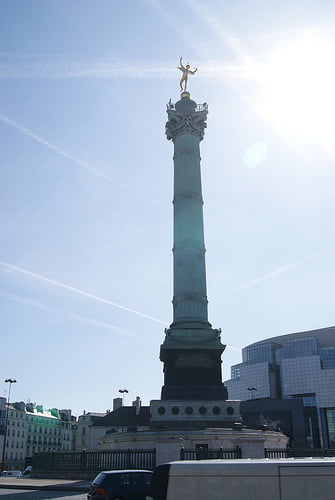What the French Révolution means to me
When I finished my undergraduate degree in France, I heaved a giant sigh of relief – as I imagine many recent undergraduates do – and then I resolved to never go into academia again. It was exactly as decisive and restrictive a decision as one can expect from a 20-year-old, but given the child that I once was, it was slightly surprising.
I was the kid who loved back-to-school. I liked color-coding my notebooks and folders. I craved the moment when I wrote that first line of black ink.
That sort of love soon disappears, and by the time I finished my degree at the American University of Paris, I was ready to be done. Which makes it all the more surprising (or perhaps not; I still lack the distance from the moment to know) that I returned to school a mere year-and-a-half later, to complete a Masters degree in French Literature at the Sorbonne.
I won’t pretend that I don’t get a lot of confused faces, searching for something positive to say about such a decision, especially in a time when the economy is hardly friendly to graduates from lucrative programs, much less from literature degrees. I don’t try to explain. How can I explain something that I understand so little myself?
My Masters thesis in literature is an exploration of the idea of equality, an idea so fundamental in France that most French people don’t even really understand why I’m studying it. Equality is the unnoticed undercurrent that exists in everything, in the day to day, in legislation, in education. It is the base point from which everything else grows.
In America, the equivalent idea is liberty: a related idea that hardly seems different, until you notice exactly how different it is. In America, we’re told we can be anything; in France, they’re asked to choose early on, to establish a lifestyle that is maintainable and realistic. In America, it’s all about the possible; here, it’s all about what’s done; what is already. We’re told to crave everything; they’re taught to want the status quo.
When we fall, we fall far. They hardly ever fall: the system doesn’t allow it.
To say it in such a way seems limiting and invites argument, and as a result, I don’t discuss it frequently. Perhaps, also, I don’t want to explain the feeling I get of walking into the national library, of combing the stacks for heavy tomes with Balzac, Hugo, Flaubert and Stendhal emblazoned on them. I don’t want to tell people the heart swell I get when I page through my hardcover edition of Les Misérables, of how I cried at the end of Le Père Goriot.
I suppose the most difficult part to explain is how much I long for it all. It’s an element of French culture that, to me, is so visceral, and I find it nearly angering that none of my French friends seem to notice or care how deeply Hugo’s words and Flaubert’s ideals still ring true today.
I want to shove underlined passages under the noses of uninterested Frenchmen, to point to them and say, “Look, see. This is why you are the way you are. This is why I will never be like you.”
The more I delve into the 19th century words, the more I realize that some elements of this country will always be inherently foreign, for the simple reason that I don’t have red and black boiling in my blood. I did not inherit this Révolution; it doesn’t belong to me. At the end of the day, it’s not mine.
Image credits1. Livres anciens, bu Zigazou76 on Flickr
2. Livre, by Skyline-Photo on Flickr
3. Bastille, by Usraek on Flickr
4. Les misérables, by alev.adil on Flickr











Bonjour Emily. You are true. It is so obvious to us we don’t even see it anymore. 🙂
C’est pour ça, Emily, que je doute que j’aille voir en Australie une vraie révolution. Il parait qu’ici on n’est pas doté suffisamment de l’attitude ‘coq’. Je me souviens d’un mouvement très transitoire pendant une année des années ’90 (je ne me rappelle plus quand exactement, mais je crois que c’était lors de la popularité du spectacle musical “Les Misérables” car les partisans du mouvement, qui en avaient ras-le-bol des injustices sociales, avaient choisi comme ‘hymne’ thématique la chanson de “Les Mis”: “Do you hear the people sing?” Mais les manifs et la ferveur ont été oubliées après peu de temps et la flamme révolutionnaire s’est éteinte. Tout ça me suggère qu’un peu partout dans le monde anglo, il y a pas mal de gens qui voudraient réagir de manière, mettons, plus ‘française’ et savoir râler, face aux injustices.
Côté histoire embarrassante, la bataille (escarmouche?)de l'”Eureka Stockade” de 1854, lorsque des mineurs se sont opposés à la gendarmerie, en refusant de payer les frais exorbitants de permis de minage, n’a duré que 20 minutes, je crois. Tu vois ce que je veux dire?